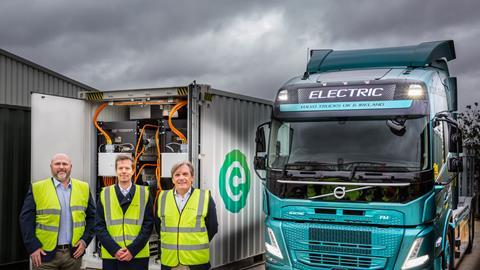Two Volvo truck dealerships are using an innovative energy storage system to provide the power to charge electric HGVs, after discovering their infrastructure did not have the required import capacity.
Volvo Trucks UK said many organisations lacked the available electricity capacity to install the charging kit needed for lorries, which can be up to 50 times more powerful than fast chargers for cars.
However, it turned to Connected Energy, which provides second-life energy storage systems, to install its 300kW E-STOR system at dealerships in Carlisle and Enfield and the problem has been zapped.
E-STOR acts like an energy reservoir, storing power from the grid or on-site renewables during periods of low demand and then releasing it during peak periods.
E-STOR can also be programmed to respond to the energy demands on site and can integrate with on-site solar arrays and is doing so at the Enfield site.
And because E-STOR uses second-life batteries from former EVs, it provides carbon savings compared to an energy storage system that uses new batteries.
Christian Coolsaet, MD at Volvo Trucks UK & Ireland, said: “As a market leader in electric trucks, it is important that we can provide high-powered charging at our key locations within our dealer network to support our customers.
“However, we are faced with grid capacity constraints at almost all our sites which is impacting our infrastructure plans.
“By installing Connected Energy’s battery energy storage systems, we can bring additional power onto the sites which helps us to move forward with the installation of high-powered charge points.”
Matthew Lumsden, chief executive at Connected Energy said truck depots were not designed for EV charging capabilities, “so many of them are facing capacity issues as they look to extend their range into larger vehicles”, he said.
“E-STOR is often a more affordable alternative to expensive grid infrastructure upgrades – or in some cases the only option.”














